
Related
Guests
- Anatol Lievensenior fellow for Russia and Europe at the Quincy Institute for Responsible Statecraft.
The United States has imposed new sanctions on Russia and expelled 10 Russian diplomats after the Biden administration accused Moscow of being involved in major cyberattacks. The Treasury Department claimed Russia interfered in the 2020 election and was behind the SolarWinds hack, which compromised the computer systems of nine U.S. government agencies and scores of private companies. The sanctions target 32 Russian entities and individuals and bar U.S. banks from purchasing Russian government debt. Russia vowed to retaliate against the new sanctions and accused the Biden administration of degrading bilateral relations. “The most dangerous aspect of this is it introduces something new into international relations, because despite the way that it’s being described, this was not an attack on the U.S.,” says Anatol Lieven, senior fellow for Russia and Europe at the Quincy Institute for Responsible Statecraft. “Never previously have sanctions been imposed in response to an espionage case, for the very good reason that every country, including the United States, engages in espionage.”
Transcript
AMY GOODMAN: This is Democracy Now!, democracynow.org, The Quarantine Report. I’m Amy Goodman.
We end today’s show looking at U.S.-Russian relations. The United States has imposed sweeping new sanctions on Russia and expelled 10 Russian diplomats yesterday, as the Biden administration accused Moscow of being involved in, quote, “some of the most dangerous and disruptive cyberattacks in recent history.” The U.S. Treasury Department accused Russia of interfering in the 2020 election and being behind the SolarWinds hack, which compromised the computer systems of nine U.S. government agencies and scores of private companies. The sanctions target 32 Russian entities and individuals. They also bar U.S. banks from purchasing Russian government debt.
The sanctions come just days after President Biden spoke with Russian President Vladimir Putin. On Thursday, Biden threatened to take more action.
PRESIDENT JOE BIDEN: I was clear with President Putin that we could have gone further, but I chose not to do so, to be — I chose to be proportionate. The United States is not looking to kick off a cycle of escalation and conflict with Russia. We want a stable, predictable relationship. If Russia continues to interfere with our democracy, I’m prepared to take further actions to respond.
AMY GOODMAN: The Biden administration has been hinting for weeks it might also take covert actions against Russia, as well. In March, national security adviser Jake Sullivan said the U.S. response would be a, quote, “mix of tools seen and unseen,” unquote.
Russia vowed to retaliate against the new sanctions and accused the Biden administration of degrading bilateral relations. Biden has proposed a summit this summer with Vladimir Putin, but the Kremlin has said the new sanctions don’t help make such a meeting happen.
This all comes as tension is escalating on the Ukraine-Russian border.
To talk more about it all, we’re joined by Anatol Lieven, senior fellow for Russia and Europe at the Quincy Institute for Responsible Statecraft. He’s the author of numerous books on Russia and the former Soviet republics, his most recent book, Climate Change and the Nation State: The Case for Nationalism in a Warming World.
Thanks so much for joining us. Can you start off by responding to these sweeping sanctions? I mean, there’s been quite a week here. You have President Biden announcing that the U.S. will withdrawal all troops from Afghanistan by September 11th, and then he cracks down on Russia.
ANATOL LIEVEN: Well, the sanctions could have been more sweeping. It targets Russian debt, but Russia doesn’t have big debts, and most of the debt is held by Europe or China, so the economic effects will be limited.
I think the most dangerous aspect of this is that it introduces something new into international relations, because despite the way that it’s been described, this was not an attack on the U.S. SolarWinds was an espionage operation — which the U.S., of course, conducts, including in cyberspace, in a great many countries of the world. Now, for that, in the past, the expulsion of diplomats, or spies, would have been entirely appropriate. That’s in accordance with international tradition. But never previously have sanctions been imposed in response to an espionage case, for the very good reason that every country, including the United States, engages in espionage. So I think this is something new and, I would say, a pretty bad precedent.
As to the other elements, well, we don’t really know, because, of course, no concrete evidence has been released on just exactly what Russia is supposed to have done during the elections. One thing that we do know is that they didn’t actually try to rig the elections. There was no attempt to take over electronic voting machines through cyberspace or whatever. So, it was basically an influence operation. Well, on that, opinion is divided. Of course, the United States also engages in influence operations all over the world, though, in America’s case, they’re mostly, though not entirely, overt, by any manner of means, if you look at the history of the CIA.
So, there is, I’m afraid, a kind of inconsistency here in U.S. policy, and, to a certain extent, you know, “Do what I say, not what I do.” The U.S. is making one set of rules for itself, another for the rest of the world — except, of course, for Israel, which has just conducted not a cyber espionage operation, a cyber sabotage operation against Iran, with, of course, no condemnation from the United States. So, I’m afraid that most of the world will see this as a case of double standards.
AMY GOODMAN: On Thursday, the Biden administration made it clear that the sanctions were not tied to claims that Russia had paid bounties to the Taliban to kill U.S. troops. The CIA is saying it has low to moderate confidence in these intelligence reports. This was a big deal when it first came out. Talk about this.
ANATOL LIEVEN: Well, I think, look, if the CIA says it’s low to moderate, I think we can assume that it’s very low. What they also say is that one of the reasons they think it’s low to moderate is that this information came from Afghan detainees, prisoners in Afghanistan. Well, you know, a prisoner in Afghanistan, especially one who has been through the hands of the Afghan secret service, is going to say exactly what he thinks will please his interrogator. So, no confidence can be reposed in this.
It also seems completely counterintuitive. The Taliban doesn’t need Russian encouragement to attack American soldiers; it makes up its own mind about that. So, I can’t really understand why they mention this case at all in this context, only to cast — well, not to deny it completely, but to sort of keep it alive, semi-alive. This seems to me not a responsible way to behave. And in the Afghan context, particularly because if there is any chance of reaching a peace settlement in Afghanistan — and, of course, equally importantly, keeping that settlement in place after U.S. troops withdraw — then the key part will be played by Afghanistan’s neighbors, including Russia. So, the United States actually does need Russian help in Afghanistan. And this is not a good way to go about getting it.
AMY GOODMAN: On Thursday, President Biden urged Russia to refrain from military action in Ukraine. This is what he said.
PRESIDENT JOE BIDEN: I also made clear to President Putin that the United States is unwavering in our support of our allies and partners in Europe. In that vein, I expressed concern about Russia’s military buildup on Ukraine’s border and in occupied Crimea. I affirmed U.S. support for the sovereignty and territorial integrity of Ukraine, and I strongly urged him to refrain from any military action. Now is the time to deescalate.
AMY GOODMAN: So, if you can talk about what’s happening in Ukraine, also the significance of the wide-ranging sanctions in the context of what’s happening there, and your concern about possibly Ukraine attacking?
ANATOL LIEVEN: Well, I think we should keep in mind what happened in Georgia in August 2008, when the then-Georgian government of President Saakashvili thought that it had full American backing, and, in consequence, launched a military attack on the breakaway territory of South Ossetia, which was being protected by the Russian army. Not surprisingly, this led to war. Not surprisingly, that the Georgians were defeated. And not surprisingly, America did not go to war against Russia for the sake of Georgian South Ossetia. I think it is very important to make clear to the Ukrainians that they may be a kind of partner of the United States, but they are not an ally. America is very, very unlikely to go to war with Russia if there is a new war in Ukraine. And after all, it’s been seven years now since this conflict first broke out. In those years, there has been no evidence of Russian desire for a new full-scale war. There have been endless, of course, skirmishes in the Donbas.
On the Ukrainian side, recently, there have been measures which Russia sees as escalatory — a crackdown on pro-Russian political parties and politicians in Ukraine and the cutoff of water to the province of Crimea, which Russia has annexed. Now, not going into the rights and wrongs of this dispute or conflict, we do need to keep firmly in mind that if a new war does start, and certainly if Ukraine or the Ukrainian government were to launch a war, Ukraine would almost certainly be defeated. And the United States would almost certainly not go to war with Russia. You know, despite all this talk of support for Ukraine, the last American military reinforcement of Europe over the past couple of weeks to Germany was 500 men. If America was really thinking of the really serious possibility of going to war with Russia in Ukraine, it would not be sending 500 men to Europe, it would be sending 500,000 men to Europe. You would see a complete reconfiguration of American military deployments and American military spending around the world. China would be put on the shelf. The containment of China would be abandoned. Everything would have to be focused on defending Ukraine. As we see, that is not happening.
So, there is a strong element of show about all this. Now, I don’t think for a single second Russia is going to invade Ukraine, because the economic price it would pay, including the loss of this gas pipeline to Germany, would be enormous then. It would lead to a complete breach with the European Union, which would hurt Russia very seriously economically. But nonetheless, remembering what happened in August 2008, the Biden administration must not give the Ukrainians the impression that they have more support from America than they actually do have.
AMY GOODMAN: And again, the significance of Biden saying that he will pull U.S. troops from Afghanistan — although it’s clear, with The New York Times report, 18,000-some-odd mercenaries, intelligence people, etc., would stay there — by September 11th, what this means for Afghanistan, what this means for Pakistan, what this means for the world?
ANATOL LIEVEN: Well, I mean, what it means for Afghanistan is that unless there is a political settlement, which looks terribly unlikely, between the Taliban and the Afghan government, the civil war will continue, but now with the Afghan forces, of course, at even more of a disadvantage compared to the Taliban.
Now, on the other hand, from the point of view of U.S. interests, the biggest terrorist threat to the United States by far now is not al-Qaeda. It’s ISIS, which in Afghanistan there is a branch of it there. It’s called Daesh. Now, something to keep in mind is that the Taliban have been fighting very hard against ISIS in recent years, because they’re rivals for the same territory. What is more, ISIS is largely made up of Pakistani Taliban fighters driven across the border by the Pakistan Army when they won their war against them a couple of years ago. So Pakistan is also very opposed to ISIS in Afghanistan. So, there are opportunities there for, if you like, an anti-terrorist coalition on the ground.
Whether there are opportunities for stable Afghan peace between the Taliban and the government, that, I’m afraid, I’m much more doubtful about. But one thing I am certain of, having lived and worked in that region, is that any long-term peace can only be guaranteed by Afghanistan’s neighbors. That is Pakistan, India, Iran, Russia and China. If you don’t have them on the same page and really backing a peace settlement, that peace settlement will not survive.
AMY GOODMAN: You mentioned Iran. We just have 30 seconds. But the attack that Iran is blaming on Israel of the Natanz nuclear facility, allegedly to blow up the deal, the Iran nuclear deal, that Biden wants to reinstate, your thoughts?
ANATOL LIEVEN: Well, yes, it clearly was intended to blow up that deal. So far, the Iranians, very sensibly, have not retaliated. But I assume that Israel will keep trying, and at some point Iran’s patience may crack. I hope not.
AMY GOODMAN: Well, I want to thank you so much for being with us, Anatol Lieven, senior fellow for Russia and Europe at the Quincy Institute for Responsible Statecraft, speaking to us from Doha, Qatar.
And that does it for our show. Democracy Now! is currently accepting applications for a senior news producer to join our team here in New York City. The deadline to apply is this Monday, April 19th. To learn more, go to democracynow.org.
That does it for our broadcast. Democracy Now! is produced with Renée Feltz, Mike Burke, Deena Guzder, Nermeen Shaikh, María Taracena, Carla Wills, Tami Woronoff, Charina Nadura, Sam Alcoff, Tey-Marie Astudillo, John Hamilton, Robby Karran, Hany Massoud and Adriano Contreras. Our general manager is Julie Crosby. Special thanks to Becca Staley, Miriam Barnard, Paul Powell, Mike Di Filippo, Miguel Nogueira, Denis Moynihan, Hugh Gran. I’m Amy Goodman. Wear a mask. Stay safe.

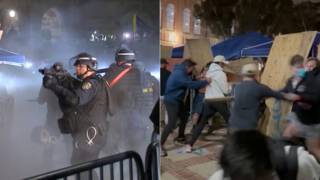
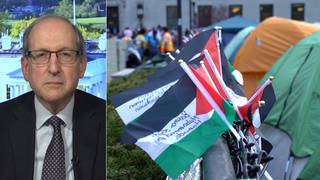
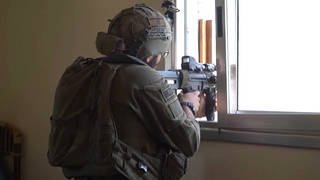
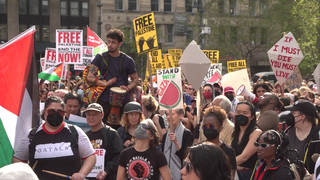





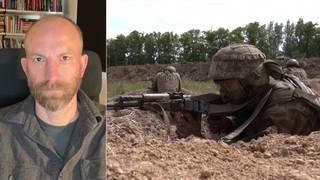
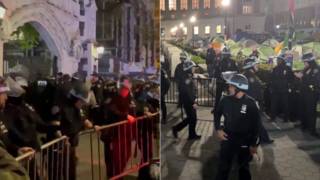
Media Options